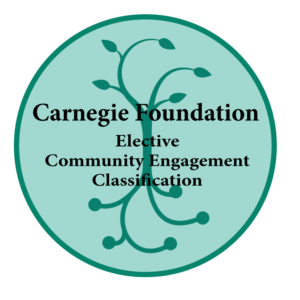Carnegie Classification
CARNEGIE FOUNDATION SELECTS COLLEGES AND UNIVERSITIES FOR 2020 COMMUNITY ENGAGEMENT CLASSIFICATION
 (Stanford, CA & Providence, R.I.) – The Carnegie Foundation has announced that Lafayette College is one of the 119 U.S. colleges and universities to receive the Carnegie Community Engagement Classification, an elective designation that indicates institutional commitment to community engagement. (Stanford, CA & Providence, R.I.) – The Carnegie Foundation has announced that Lafayette College is one of the 119 U.S. colleges and universities to receive the Carnegie Community Engagement Classification, an elective designation that indicates institutional commitment to community engagement.
This important classification is awarded following a process of self-study by each institution, which is then assessed by a national review committee led by the Swearer Center for Public Engagement at Brown University, the administrative and research home for the Carnegie Community Engagement Classification. “These newly-classified and re-classified institutions are doing exceptional work to forward their public purpose in and through community engagement that enriches teaching and research while also benefiting the broader community,” noted Mathew Johnson, executive director of the Swearer Center. Of the 119 institutions classified in the 2020 cycle, 44 are receiving the classification for the first time while 75 are now re-classified, after being classified originally in 2010 or 2015. These 119 institutions join the 240 institutions that earned the classification during the 2015 selection process, for a total of 359 campuses who are currently active holders of this important designation. Among the 2020 recipients of the classification, 67 are public institutions and 52 are private. For Carnegie’s Basic Classification, 52 are classified as research universities, 39 are master’s colleges and universities, 22 are baccalaureate colleges, 3 are community colleges, and 3 institutions have a specialized focus—arts, medicine, and other health professions. They represent campuses in 37 states and U.S. territories. The Carnegie Community Engagement Classification has been the leading framework for institutional assessment and recognition of community engagement in U.S. higher education for the past 14 years with multiple classification cycles in 2006, 2008, 2010, 2015 and 2020. |